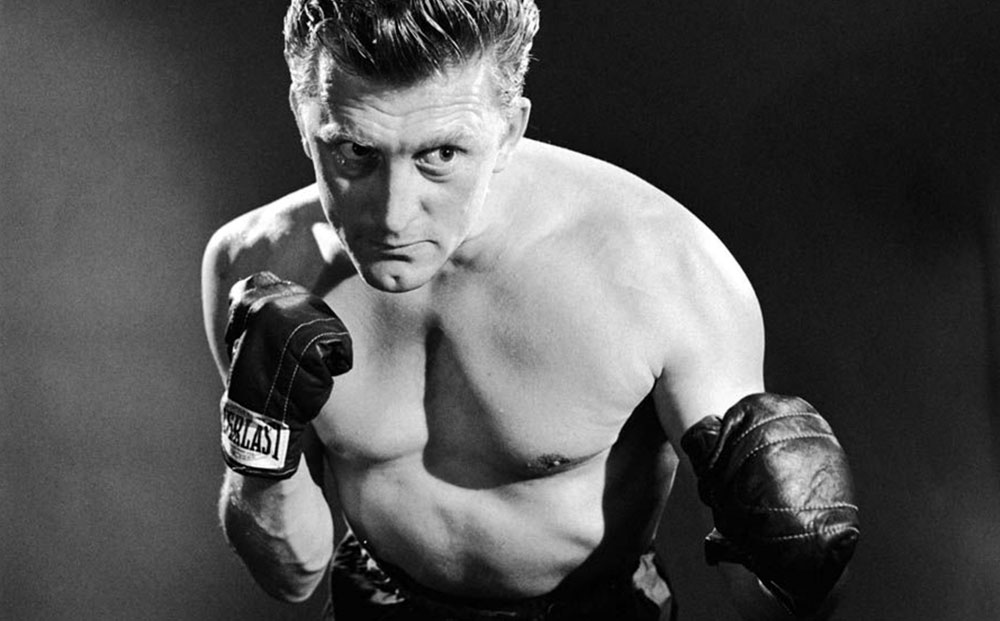In the late 1940s, in conjunction with the continued evolution of noir style, the boxing picture saw a brief yet notable uptick in production. While by no means the first films to take the sport as their subject, these novel pugilist portraits sparked friction at rival studios. Mark Robson’s rise-and-fall saga Champion (1949), one of the major films in the decade’s boxing cycle, emerged during an ugly spat between its distributor, United Artists, and RKO, the studio behind Robert Wise’s The Set-Up (1949). Produced by Stanley Kramer for UA in one of his earliest projects, Champion found itself in competition with RKO’s Robert Ryan-led boxing film, leading Howard Hughes and studio leaders to claim that scenes involving a boxer pressured to throw a fight were far too similar to their picture. Recalled in a series of contemporaneous columns in The New York Times, the months-long drama saw Kramer initially refute the accusation that his film “virtually duplicated” material from Wise’s picture. RKO then sued, with the saga concluding when UA acquiesced and made minimal cuts.
Despite this heavyweight slugfest behind-the-scenes, Champion was ultimately the more successful film, netting Kirk Douglas his first of three Oscar nominations and further buffeting his movie star bona fides. Yet, in one of those serendipitous ironies of history, Champion is now somewhat less renowned than its competitor, lacking the forceful spatio-temporal containment of Wise’s film. Regardless of those changing tides of critical favor, Robson’s spin on the boxing story exists at the intersection of major careers and key generic movements, augmenting the need for additional scrutiny.
From a screenplay by High Noon (1952) writer Carl Foreman, the film adapts Ring Lardner’s short story of the same name. It presents the tale of Midge Kelly (Douglas), a boxer who stumbled his way into the sport and scraped his way to the top. It’s “a story that could only have been lived in the fight game,” the ringside announcer boasts, of a man who “rose from the depths of poverty to become champion of the world.” From this in media res opening at a title fight, Champion flashes back to chronicle Midge’s journey: his entrance into boxing, his romantic entanglements, and his ever-deepening self-interest as his ego and power grow.
Though saddled with some of the familiar baggage we’ve come to expect from boxing stories, Champion thrives as an incisive study of wounded, violent masculinity. For a viewer familiar with Douglas’s famed turns as the manipulative-yet-magnetic reporter Chuck Tatum in Billy Wilder’s Ace in the Hole (1951), or the tempestuous producer Jonathan Shields in Vincente Minnelli’s The Bad and the Beautiful (1952), Midge Kelly will seem like a natural predecessor. Early in the film, Midge shows some capacity for kindness and virtue, intensely protective of his disabled younger brother (Arthur Kennedy) while maintaining his wiseacre sensibilities, always cracking clever jokes with that quintessentially devious Douglas smirk. However, character traits of a more vicious sort begin to emerge early and often, with Midge’s cockiness masking a frightening inferiority complex rooted in childhood abandonment. As the film continues down this chilling path, Midge’s sociopathy only grows more apparent.
The arc of Foreman’s script can indeed verge on the moralistic, teeing up a fateful comeuppance for Midge and a cautionary tale of wayward ambition for the spectator. Yet the moodiness of Robson’s high-contrast imagery, the white hot lights of Douglas’ charismatic star power clashing up against the pitch black visual abyss that surrounds Midge, gives the familiar tropes a potent electricity. When paired with Douglas’s expert account of this deeper drift into increasingly delirious megalomania, the film maintains its urgency. “People cheering for me,” a dazed and beaten Midge boasts in the final scene, a lust for applause that can only be viewed as a petty victory in the face of all he has lost. But it is precisely such pettiness, such hopeless, single-minded desire for approval and success and power, that makes Midge feel so intensely familiar even decades later, a reminder of the bankrupt men who have always risen high and, inevitably, fallen even further.
Champion screens this evening, February 24, at Film Forum on 35mm as part of the series “Tales from The New Yorker.”



